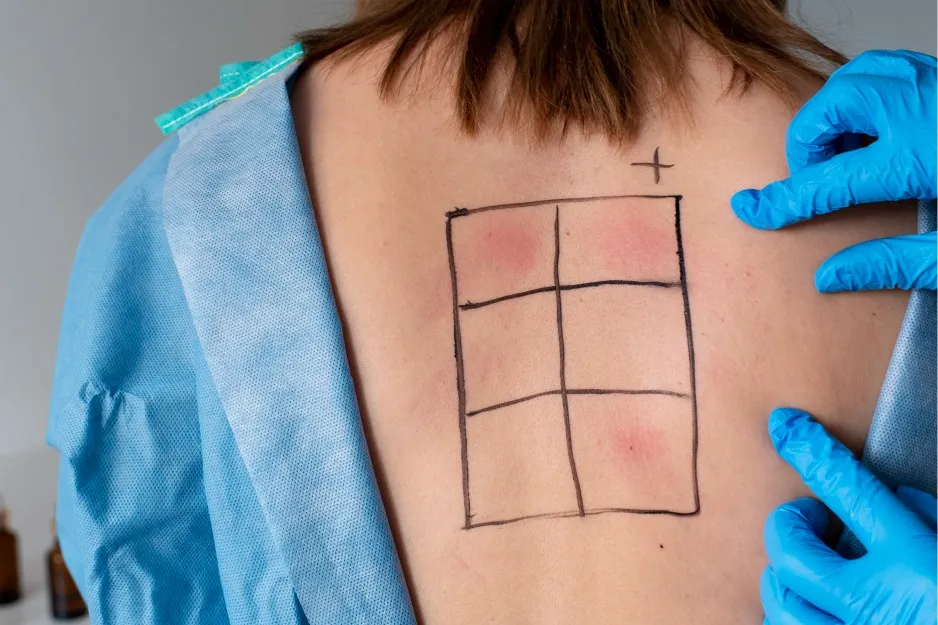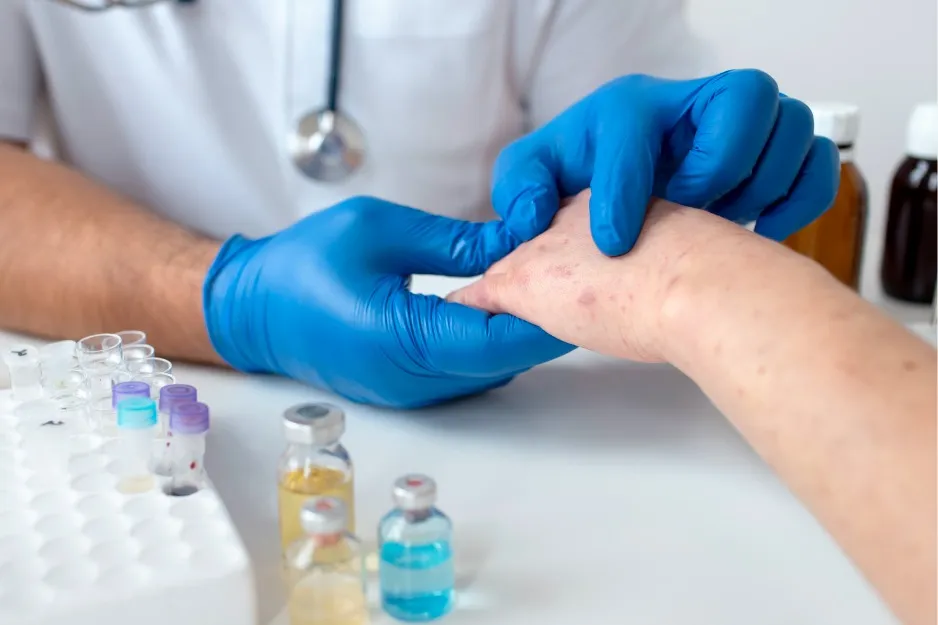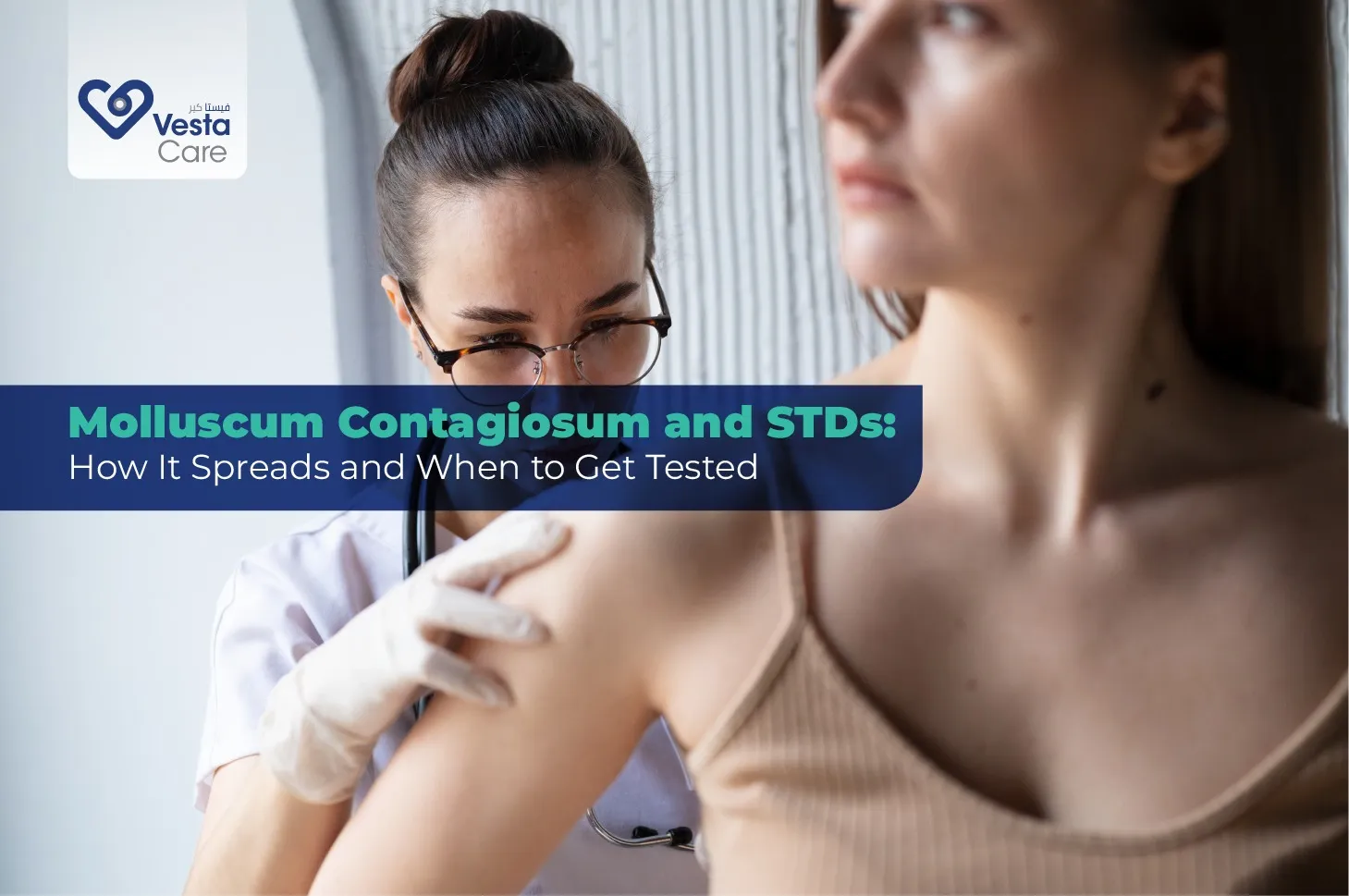Living in Dubai's warm climate creates ideal conditions for various skin infections, including molluscum contagiosum. This common yet often misunderstood viral infection raises important questions about transmission, its relationship to sexually transmitted diseases, and when professional testing becomes necessary. Understanding molluscum contagiosum helps Dubai residents make informed decisions about their health and seek appropriate care when needed.
What is Molluscum Contagiosum?
Molluscum contagiosum is a viral skin infection caused by the molluscum contagiosum virus (MCV), a member of the poxvirus family. This benign condition produces small, raised bumps on the skin with a characteristic pearl-like appearance and central dimple. These lesions, called mollusca, typically measure 2-5 millimeters in diameter and appear dome-shaped with smooth, firm surfaces.
The virus affects approximately 122 million people worldwide, with particularly high prevalence in warm, humid regions—making Dubai's climate a conducive environment for transmission. The infection occurs most commonly in children aged 2-5 years but has increasingly affected sexually active teenagers and adults over the past 25 years.
Four subtypes of molluscum contagiosum virus exist, with MCV-1 responsible for 98% of cases, primarily affecting children. MCV-2 mainly causes infections in adults, particularly through sexual transmission. Understanding these distinctions helps clarify the infection's diverse transmission patterns across different age groups.

How Molluscum Contagiosum Spreads
Understanding transmission mechanisms is crucial for prevention. Molluscum contagiosum spreads through several pathways, each presenting unique risk factors relevant to Dubai's population. Direct skin-to-skin contact represents the primary transmission route. When infected skin touches healthy skin, the virus transfers making this particularly common in children during play, sports, or swimming activities.
Sexual contact serves as the most common transmission route among adults. The virus spreads during intimate skin-to-skin contact, including vaginal, anal, or oral sexual activity. When lesions appear in the genital area, lower abdomen, inner thighs, or buttocks, sexual transmission is likely. Approximately 30% of adults diagnosed with genital molluscum contagiosum have coexisting sexually transmitted infections, highlighting the importance of comprehensive STD testing.
It is also possible to get the disease indirectly by touching contaminated objects. Sharing towels, clothing, gym equipment, razors, or personal items with infected individuals can spread the virus. Dubai's numerous fitness centers, spas, and swimming pools present environments where such transmission can occur if proper hygiene isn't maintained.
Autoinoculation represents another significant spread mechanism. Scratching or touching existing lesions and then touching other body areas transfers the virus, causing new bumps to appear. This explains why lesions often cluster together or spread across the body, particularly when individuals unknowingly scratch affected areas.
The virus thrives in warm, humid environments—conditions Dubai experiences year-round. Swimming pools, locker rooms, saunas, and shared facilities in hotels and residential complexes provide ideal environments for viral persistence and transmission.
Is Molluscum Contagiosum an STD?
This question generates considerable confusion, and the answer requires nuanced understanding. Molluscum contagiosum can be considered a sexually transmitted infection when transmitted through sexual contact and lesions appear in genital areas. However, it differs fundamentally from traditional STDs like chlamydia, gonorrhea, or herpes.
The critical distinction lies in transmission versatility. Unlike exclusive STDs that spread only through sexual contact, molluscum contagiosum spreads through multiple non-sexual routes. Children commonly contract it through casual contact during play, swimming, or school activities. Adults can acquire it through gym equipment, shared towels, or close personal contact without any sexual activity involved.
For sexually active adults in Dubai, when molluscum lesions appear in genital regions, sexual transmission becomes the most likely route. Research shows that over twice as many men as women receive diagnoses at STD clinics, and genital molluscum often coincides with other sexually transmitted infections. Studies indicate that 30-32% of adults with genital molluscum test positive for additional STDs.
This dual nature—capable of both sexual and non-sexual transmission—makes molluscum contagiosum unique. Having molluscum doesn't automatically indicate sexual activity or infidelity, which is important for maintaining healthy relationships and avoiding unwarranted accusations.
Recognizing Molluscum Contagiosum Symptoms
Early recognition enables prompt management. The incubation period ranges from 2-7 weeks after exposure, though it can extend to six months in some cases. During this time, the virus remains dormant before visible lesions appear.
The hallmark symptom is small, flesh-colored, pink, or white bumps with a distinctive central dimple or indentation. These papules feel firm initially but may soften over time. Lesions typically appear in groups rather than singly, with most people developing 20–30 bumps, though the numbers vary significantly.
In children, bumps commonly appear on the face, trunk, arms, legs, and armpit areas. Palms and soles rarely show lesions. For adults with sexually transmitted molluscum, lesions concentrate in genital areas, the lower abdomen, inner thighs, groin, and buttocks—reflecting the route of transmission.
Most lesions remain painless, though they may become itchy, sore, red, or swollen. When bumps turn red and inflamed, resembling pimples, this indicates your immune system is fighting the infection—a positive sign that healing is approaching. However, scratching or picking at lesions can introduce bacterial infections, causing additional pain, swelling, and yellow discharge.
Immunocompromised individuals, including those with HIV or undergoing immunosuppressive treatments, may develop larger, more numerous lesions that spread widely across the face and body. These atypical presentations require particular attention in Dubai's diverse population.
When to Get Tested in Dubai
Knowing when to seek professional evaluation protects your health and prevents transmission to others. You should get tested if you notice unexplained bumps or lesions on your skin, particularly in genital areas. Even if you're unsure whether bumps are molluscum or another condition, professional diagnosis ensures appropriate treatment.
Comprehensive STD testing becomes crucial if you engage in sexual activity and develop genital lesions. Since 30% of adults with genital molluscum have concurrent STDs, testing for common sexually transmitted infections in Dubai provides a complete health assessment. Vesta Care's confidential at-home STD testing service offers convenient screening without embarrassing clinic visits.
Testing is particularly important if you have multiple sexual partners, engage in unprotected sex, or if your partner has been diagnosed with molluscum or other STDs. Pregnant women who suspect molluscum should also seek evaluation, as the virus can potentially transmit to babies during birth.
Dubai residents with weakened immune systems due to HIV, cancer treatments, organ transplants, or immunosuppressive medications should test promptly when skin lesions appear. Molluscum presents more severely in immunocompromised individuals, requiring specialized management.
Treatment Options Available in Dubai
Understanding treatment choices helps manage expectations. Molluscum contagiosum typically resolves spontaneously within 6-18 months as your immune system clears the infection. Many healthcare providers recommend waiting for natural resolution, particularly in children, as treatment can be uncomfortable and isn't always necessary.
However, treatment may be advisable to prevent spread to others, avoid autoinoculation, reduce discomfort, or address cosmetic concerns. Treatment for genital lesions is particularly recommended to prevent sexual transmission and enable safer intimate contact.
Physical removal methods include cryotherapy with liquid nitrogen, curettage (surgical scraping), and laser therapy. These procedures typically require multiple sessions and may cause temporary discomfort. Topical medications like cantharidin, imiquimod, or retinoid creams can be applied at home, though these may irritate surrounding skin.
The newly FDA-approved medication berdazimer sodium (Zelsuvmi) offers a specific treatment option, though availability in Dubai should be confirmed with healthcare providers. Some practitioners recommend oral cimetidine for children as a less invasive alternative.
Vesta Care's DHA-licensed doctors provide convenient at-home consultations throughout Dubai, examining lesions privately in your residence and recommending appropriate treatments. Our 24/7 availability ensures you receive professional care when you need it, whether in Jumeirah, Dubai Marina, Downtown Dubai, or any area across the emirate.
Prevention Strategies for Dubai Residents
Protecting yourself and your family requires practical preventive measures suited to Dubai's environment. Avoid direct skin contact with anyone showing visible lesions. If you have molluscum, cover bumps with clothing or waterproof bandages when around others, particularly in swimming pools, beaches, and gyms.
Practice good hygiene in shared facilities. Don't share towels, razors, clothing, or personal items at gyms, spas, hotels, or residential facilities. Dubai's numerous fitness centers and recreational facilities require vigilance about personal hygiene and equipment cleanliness.
For sexually active individuals, limiting partners reduces exposure risk. While condoms provide important protection against many STDs, they don't fully prevent molluscum transmission since the virus spreads through any skin-to-skin contact in the genital area. Abstaining from sexual activity until lesions completely heal prevents transmission to partners.
If you have molluscum, avoid scratching or picking at lesions, as this spreads infection to other body areas. Don't shave over affected areas, as this can distribute the virus along the razor's path. Keep hands clean and avoid touching lesions unnecessarily.
Parents in Dubai should teach children not to share toys, towels, or clothing with friends showing skin lesions. However, children with molluscum can still attend school and activities—covering lesions with clothing provides adequate protection for others.
Take Control of Your Sexual Health in Dubai
Molluscum contagiosum poses particular difficulties because of Dubai's climate and lifestyle, but understanding transmission patterns, recognizing symptoms, and knowing when to test empowers informed health decisions. While often benign and self-limiting, the infection's connection to STDs makes comprehensive testing essential when genital lesions appear.
Vesta Care eliminates barriers to sexual health testing in Dubai with completely confidential at-home services. Our DHA-licensed medical professionals provide comprehensive STD screening including chlamydia, gonorrhea, HIV, hepatitis, syphilis, and herpes—all from the privacy and convenience of your home, hotel, or office.
Don't let embarrassment or inconvenience prevent you from protecting your health. Contact Vesta Care today via Call or WhatsApp +971 52 270 4729 to schedule discreet testing anywhere in Dubai. Available 24/7 with sample collection in just 45 minutes, we bring professional healthcare directly to your doorstep across all Dubai areas, including Jumeirah, Palm Jumeirah, Dubai Marina, JBR, Downtown Dubai, Business Bay, Arabian Ranches, and beyond.

Frequently Asked Questions
Can molluscum contagiosum spread through swimming pools in Dubai?
While possible, transmission through pool water itself is unlikely. The virus spreads through direct contact with contaminated surfaces like pool toys, kickboards, and shared towels in pool areas, making hygiene vigilance important at Dubai's pools and beaches.
How long does molluscum contagiosum last?
Without treatment, lesions typically resolve in 6-18 months, though some cases persist for 3-4 years. Treatment can accelerate clearance, which many Dubai residents prefer for cosmetic reasons and to prevent workplace or social complications.
Should I get STD tested if I have genital molluscum?
Yes, absolutely. Studies show 30% of adults with genital molluscum have concurrent STDs. Comprehensive testing ensures you identify and treat any additional infections that may have no symptoms.
Is molluscum contagiosum dangerous?
No, it's a benign condition that typically causes only cosmetic concerns. However, immunocompromised individuals may experience more severe, widespread infections requiring medical attention.
Can I go to the gym or pool with molluscum? Yes, but cover all lesions with waterproof bandages and avoid sharing equipment, towels, or personal items. Inform close contacts about your condition to help them take precautions.
How do I know if bumps are molluscum or another STD?
Professional diagnosis is essential since genital warts, herpes lesions, and other conditions can look similar. Vesta Care's at-home examination service provides accurate diagnosis without clinic visits.
This article is medically reviewed by:

Recent Posts
Book Your Home Healthcare Consultation Today
Your Health Matters – Reach Out Now and Let’s Discuss How Vesta Care Can Help.











